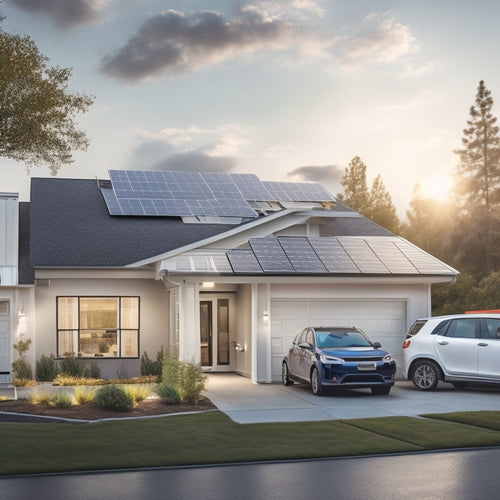
What Are the Residential Permit Requirements in CA?
Share
You'll need to obtain a building permit before installing a solar panel system in California, regardless of the system's type and size. The state has specific requirements to guarantee compliance with its building codes and safety standards. You'll need to submit detailed documents, including building plans, proof of ownership, and electrical and structural drawings. Inspections will also be necessary to verify the system is installed correctly and meets safety standards. While some projects may be exempt from permit requirements, it's crucial to confirm with your local building department to avoid surprises. Now that you know the basics, you're ready to dive deeper into the specifics.
Key Takeaways
• A building permit is required for residential solar panel system installation in California, with specific requirements varying by system type and size.
• Necessary documents for approval include a detailed package of documents, building plans, proof of ownership, electrical and structural drawings, and more.
• Inspections are required to ensure compliance with California's building codes, verifying correct installation, electrical connections, and safety concerns.
• Certain projects may be exempt from permit requirements, such as historic renovations and agricultural exemptions, but compliance with local building codes and zoning regulations is still necessary.
• Filing and processing fees, including plan check fees, permit fees, inspection fees, and zoning/land-use fees, must be budgeted for and understood to avoid surprise expenses.
California Solar Permit Requirements
In California, you need a building permit to install a solar panel system, and the specific requirements vary depending on the type and size of the system.
Don't worry, it's not as painful as it sounds! The good news is that California offers enticing incentives to make the process worth your while. With a solar panel system, you can capitalize on California incentives, such as the California Solar Initiative (CSI), which provides rebates for solar installations. Plus, with a substantial Solar ROI (Return on Investment), you'll be saving money in no time.
In fact, California's sunny climate means you'll be generating electricity and reducing your energy bills in no time. To get started, you'll need to make sure your system meets the California Building Code and local regulations. Don't stress, your solar installer will guide you through the process.
With the right permits and incentives, you'll be harnessing the power of the sun in no time!
Necessary Documents for Approval
Your solar installer will need to submit a detailed package of documents to secure approval from your local building authority. This package should include a thorough set of building plans, showcasing the solar panel system's design, layout, and installation details. These plans must conform to California's building codes and regulations.
Additionally, your installer will need to provide proof of ownership or a notarized letter from the property owner, along with a copy of the property deeds. This guarantees that the solar panel system is being installed on a property with legitimate ownership.
Furthermore, your installer may need to provide electrical and structural drawings, detailing the system's electrical connections and roof attachment methods. These documents will help the building authority assess the system's safety and compliance with local regulations.
Residential Solar Panel Inspections
After submitting the necessary documents, a residential solar panel installation must pass a series of inspections to guarantee compliance with California's building codes and regulations. You'll need to schedule an inspection with your local building department, and it's crucial to confirm that your installation meets the state's stringent standards.
During the inspection, the inspector will verify that your solar panel system is installed correctly, and all electrical connections are secure. They'll also check for potential Safety Concerns, such as proper grounding, secure mounting, and adequate clearance from obstructions.
Your Panel Maintenance routine will also be evaluated to ensure it aligns with the state's guidelines.
Don't worry; these inspections are a standard part of the process. They're in place to protect you, your property, and the environment.
Permit Exemptions and Exceptions
When going through California's residential permit requirements, you'll discover that certain projects are exempt from permit requirements or have specific exceptions. These exemptions can save you time and money, but it's essential to understand what's exempt and what's not.
Here are some examples of permit exemptions and exceptions in California:
| Project Type | Exemption/Exception | Description |
|---|---|---|
| Historic Renovations | Exempt | Renovations to historic buildings that don't alter the exterior or affect the historic integrity. |
| Agricultural Exemptions | Exempt | Agricultural buildings and structures, such as barns, silos, and fences, are exempt from permit requirements. |
| One-Story Detached Garages | Exception | One-story detached garages with a floor area of 120 square feet or less are exempt from permit requirements, but electrical and plumbing permits may still be needed. |
Keep in mind that even if a project is exempt, you may still need to comply with local building codes and zoning regulations. Always check with your local building department to confirm permit requirements before starting your project.
Filing and Processing Fees
You'll need to budget for filing and processing fees, which vary by jurisdiction and project type, but typically range from a few hundred to several thousand dollars. Don't be caught off guard by these costs – understanding the fee structures and cost breakdown is essential to avoiding surprise expenses.
Here are some key aspects to take into account:
-
Plan check fees: These fees cover the cost of reviewing your plans and ensuring they meet local building codes and regulations.
-
Permit fees: These fees grant you permission to begin construction, and their cost is often based on the project's valuation.
-
Inspection fees: You'll need to pay for inspections to ensure your project meets building codes and safety standards.
- Zoning and land-use fees: These fees cover the cost of evaluating your project's compliance with local zoning laws and land-use regulations.
Frequently Asked Questions
Do I Need a Permit to Replace Existing Solar Panels?
"When upgrading your solar panels, you'll likely need a permit, especially if the new panels affect your roofing compatibility. You'll want to check with your local building department to confirm, but chances are, a permit is in your future."
Can I Get a Permit for a Solar System on a Rental Property?
'When you're renting, getting a permit for a solar system on a rental property depends on your rental agreement and property rights. Check your contract for clauses on modifications and upgrades, then consult with your landlord to make sure you're both on the same page.'
Are There Different Permits for Grid-Tied and Off-Grid Systems?
You'll find that permit variations exist for grid-tied and off-grid systems, as they're classified differently; grid-tied systems are tied to the electrical grid, while off-grid systems stand alone, requiring distinct permits and inspections.
Do I Need a Licensed Contractor to Install My Solar System?
You'll need a licensed contractor to install your solar system, ensuring Contractor Liability coverage and a valid System Warranty; it's not a DIY-friendly task, so don't try to be a solar superhero – leave it to the pros!
Can I Install Solar Panels on a Historic Building or Landmark?
You'll need to navigate historic preservations' strict rules to install solar panels on a landmark building, ensuring architectural integrity isn't compromised; it's a delicate dance, but possible with careful planning and collaboration with local authorities.
Related Posts
-

What Electric Vehicle Owners Need for Home Energy
As an electric vehicle owner, you need to optimize your home energy system to guarantee efficient, sustainable, and c...
-

3 Best State and Local Solar Incentives USA
You can greatly reduce your energy dependence and save thousands of dollars by taking advantage of the top state and ...
-

Charging Station Incentives: Why So Many Are Free
You're likely to stumble upon free or low-cost charging stations due to a convergence of incentives. Government rebat...


